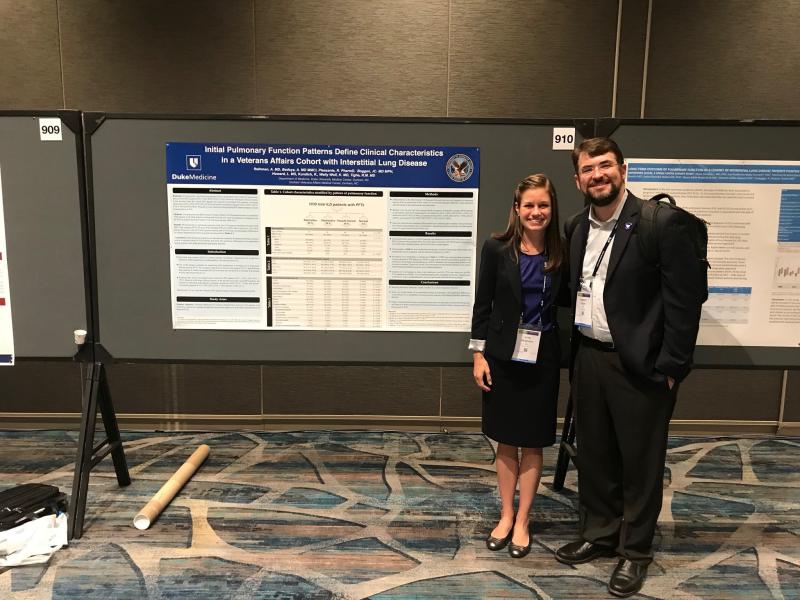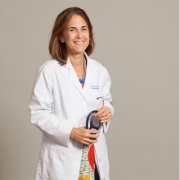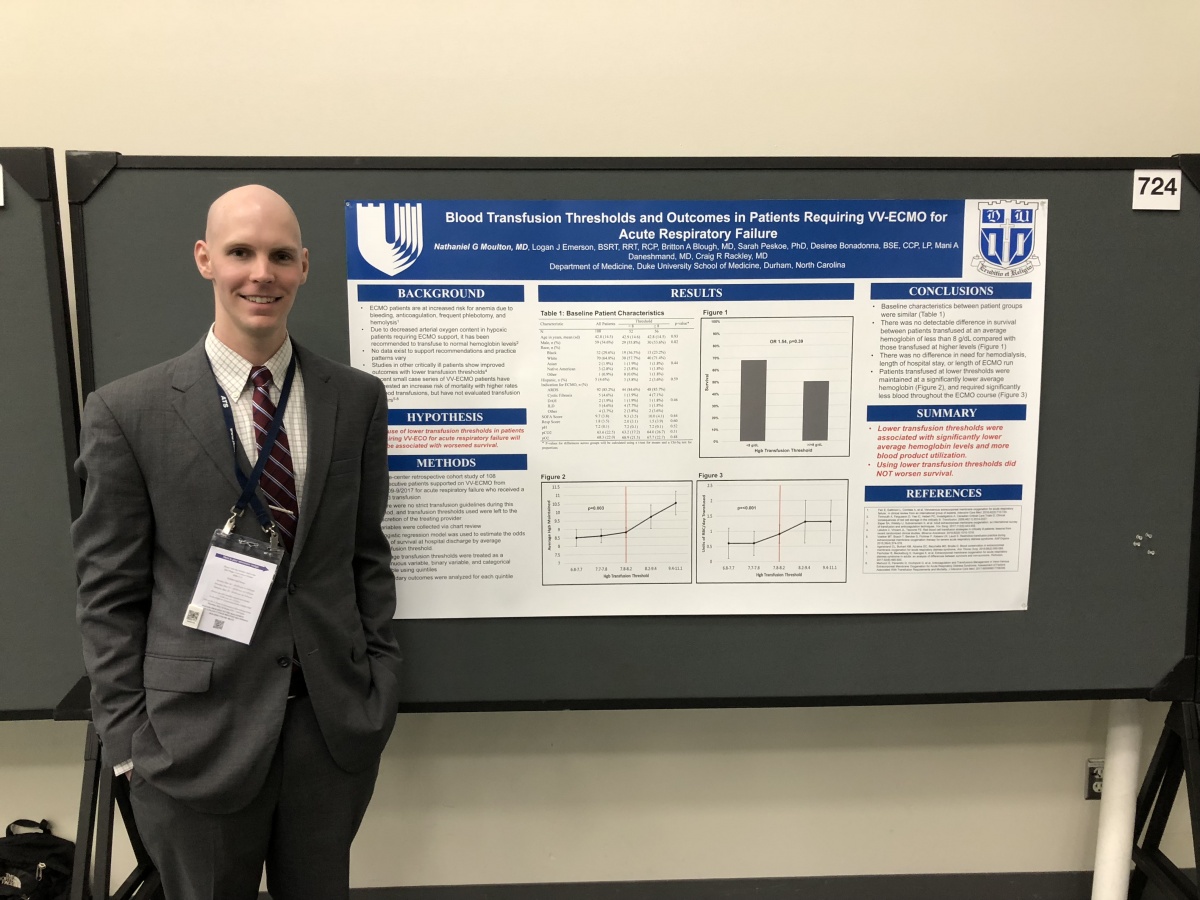
From the Director

Down to the WIRE! Hope everyone had a chance to enjoy part of the rainy weekend. Lots happening in the program as we gear up for Block 12 and the end of the academic year.
Kudos
Kudos this week go to Jessica Regan for her Good Catch Award from the Duke Patient Safety Office. Also kudos to Leah Machen for winning the first annual General Internal Medicine Research Award – it was great to hear her present her work with Dr. Clarissa Diamantidis on Monday. Many thanks to Suchita Shah Sata for organizing the Faculty Panel, and to our excellent speakers Drs. Ebony Boulware, Joanne Wilson, Diana McNeill and Laura Svetkey – we all learned a lot from hearing your stories and advice. Kudos also to Rachel Feder, Josh Lee (the elder), Robert Diep and Ashley Spann from Brian Golubski for being awesome SARs to work with at DRH, to Nancy Yang from Sarah Norton and Taylor Triana for boosting team morale on 9100 with Locopops, to Juliette Logan from Alyssa Stavig for being a Duke Gen Med Rockstar, and to Stephen Kimani from Sean Doerfler for being a fantastic SAR on Duke Gen Med, even letting Sean get away early one day to pick up an anniversary present for his wife (Happy Anniversary Sean and Shannon!).
Congratulations to Ashley Spann on her engagement!! We are all so happy for you!
Also congratulations to former chief Jenn Rymer (and Daniel and big brother Will) on the birth of Caroline!
Let’s all make sure to be there to support DVAMC CRQS Sam Lindner for his grand rounds this Friday!
PubMed from the Program
This week’s pubmed from the program goes to Nate Moulton, Shannon Niedermeyer and Annie Reihman for their presentations at the American Thoracic Society Meeting!
Have a great week!
Aimee


Clinic Corner: Ambulatory
Contributed by Daniella Zipkin
Announcing: Ambulatory Threads Coming in July
The Duke internal medicine residency changed to a 4+2 format in 2016, a schedule where 4 week in-patient rotations alternate with two week rotations such as ambulatory, geriatrics, or consults. In the fall of 2017, we collectively engaged faculty and residents in a review of the ambulatory education goals, objectives, and mission. Faculty requested continuity with learners, and residents requested a formal curriculum, bridging clinical experience with didactics. It became clear that revising the structure was imperative. The result of our effort to address these priorities is the Ambulatory Threads, which we will outline here.
The threads are designed to achieve the following goals:
- Enhance longitudinal learning/engagement between a faculty and trainee, thereby improving the overall sense of investment in trainee education
- Increase the breadth of exposure to subspecialty ambulatory training for residents
- Provide early exposure to subspecialties that do not have inpatient services (lnfectious disease, Nephrology, Gastroenterology, Rheumatology, and Endocrine)
- Improve the ability of both faculty and trainees to effectively and constructively evaluate the ambulatory learning experience
Threads Description:
In the threads, the “Plus Two” blocks include clinics in specific sub-specialties, bundled together. During the Plus Two, residents also have continuity clinic and other important educational experiences.
Threads run for six months, allowing each resident to experience two threads per year.
In the subspecialty clinics, residents will return to the same clinic approximately six times in a six-month period, to give better traction in the experience and better opportunities for teaching and engagement with faculty. Eventually, Academic Half Day will be thread specific, so the teaching will match the clinics experienced during the year.
Thread Subspecialties:
- Intern Thread A: GI/ID/other VA clinics
- Intern Thread B: Renal/Rheumatology/Endocrine
- JAR Thread A: Hematology (benign and malignant)/Cardiology
- JAR Thread B: Oncology/Pulmonary
Curriculum Changes
Every division outlined the objectives for their area specifically as they pertain to the knowledge a general internist needs to be successful and adaptable in the outpatient setting. Each division has an education champion who will 1) facilitate faculty teaching in academic half day to meet the core teaching objectives and 2) populate curricular materials on the residency website. We encourage a “flipped classroom”, with didactic presentations and reading assigned through the website to residents, reserving academic half day time for cases and interactive techniques.
Ambulatory Threads, Frequently Asked Questions, for RESIDENTS:
Will I still be able to choose a sub-specialty clinic to go to all year in my JAR year?
Yes, this will not change. As before, it will subtract one half day out of your week and result in one fewer half-day of thread themed clinic.
Can I choose which thread I’m on?
No, because every resident will experience every thread. All interns and JARs will rotate through all four threads, switching every six months. This maintains balance in the teaching you receive and is a critical component of a well-rounded internal medicine training that equips you to succeed in any career path.
Within the thread, can I choose which attendings I will work with?
Unfortunately, this isn’t feasible. Several variables were taken into account within each thread template week, and scheduling over 85 learners into them all is a huge task. Thus, we cannot take special requests (aside from sub-specialty clinic requests).
What might get in the way of spending my +2 time on the thread?
Clin Epi, geriatrics, lead weeks, DRH nights, ultrasound/procedures, vacation, and Immersion/consult rotations will take the place of thread time during some +2 blocks.
How do I prepare for my clinics?
We suggest two types of preparation. First, check Maestro at least one week before you start to ensure that your attending’s clinics have not moved sites AND/OR your attending has not cancelled clinic. While we ask attendings to notify us of cancellations or moves, the system is not foolproof and we would like to have the opportunity to help find another learning opportunity for you if a clinic is cancelled and also save you the trip to the wrong site! Second, check the patient list the night before and read up on patients you will see the next day. This will help you have a better experience in the clinic.
Do I write the notes and follow up on the labs?
Every attending has a different set of expectations regarding notes and labs. We ask that you communicate with the attending to find out their expectation. It is reasonable for you to write notes on patients you see and to send them to your attending for co-signing. For laboratory follow up, we expect that if you order a lab, you will follow it up, but that the attending is available in a timely fashion for questions. Please let us know if you are unable to reach an attending that needs to help you triage a lab result.
What happens if an assigned clinic isn’t happening of the attending isn’t available?
Please notify the Emily Richbourg and the ambulatory chief resident immediately, so we can check with the clinics and make adjustments when necessary.
What happens if I am unable to get to my assigned clinic?
Please notify both the ambulatory chief resident and the attending you are assigned to work with, so they are aware of the change. Absences will be handled in the usual way. We know that sick days happen!
How will I be evaluated during the threads?
Your thread attendings will receive evaluations for you 1-2 times in the six-month period
How will I evaluate the thread system?
You will receive a general evaluation for the thread you are on twice in the six-month period. Please provide as much detail as possible regarding what went well and what did not.
Where can I find more information and detail on the ambulatory curriculum structure?
Stay tuned for the residency curriculum website launch coming soon!
From the Chief Residents
| Date | Topic | Lecturer | Time | Location |
|---|---|---|---|---|
| 5/28/18 |
No conference - Memorial Day |
|
||
| 5/29/18 | Anticoagulation and Thrombocytopenia | Murat Arcasoy | 7:15 a.m. |
DUH 8252 |
| 5/30/18 |
Case Presentation |
Lauren Donnangelo to Diana McNeill | 7:15 a.m. | DUH 8252 |
| 5/31/18 |
Tick-Borne Illness |
Jason Stout | 7:15 a.m. | DUH 8252 |
| 6/1/18 |
Medicine Grand Rounds: QI Grand Rounds: HEART Score and Chest Pain at the Durham VA |
Samuel Lindner |
8 a.m. | DUH 2002 |
| Date | Topic | Lecturer | Time | Location | Lunch |
|---|---|---|---|---|---|
| 5/28/18 |
No conference - Memorial Day |
|
|
|
|
| 5/29/18 |
Journal Club: Review of Critical Pulmonary Trials |
Talal Dahan |
12:10 p.m. |
DUH 2002 |
Domino's |
| 5/30/18 |
Primary Care Visits Geriatrics Focus Group |
Kevin Shah and Casey Jones Juliessa Pavon |
12:10 p.m. |
DUH 2002 DUH 8252 |
Popeye's |
| 5/31/18 |
SAR Lecture: COPD Exacerbations |
Josh Lee |
12:10 p.m. |
DUH 2001 |
Subway |
| 6/1/18 |
Medicine Research Seminar: Malaria pathogenesis research - nitric oxide, vascular dysfunction, and endothelial glycocalyx |
Brice Weinberg, MD |
12 p.m. |
DUH 2002 |
Nosh |
Duke Gen Med Conference Schedule: May 28-31, 2018
| Date | Topic | Lecturer | Time |
|---|---|---|---|
| 5/28/18 |
SAR Report Chair's Sign outs - Canceled |
Orientation/Holiday |
1:15 p.m.
|
| 5/29/18 |
SAR Report |
Amanda Boyd to Joe Govert |
1:15 p.m. |
| 5/30/18 |
SAR Report Intern Report |
Brian Wasserman to Aimee Zaas Mimi Xu to Joel Boggan |
1:15 p.m. 3 p.m. |
| 5/31/18 |
SAR Report/QI Conference Intern Hospitalist Series - COPD/Asthma |
Elizabeth Gilbert to Joel Boggan Dr. Pollak |
1:15 p.m. 3 p.m. |
From the Residency Office
Call for Applications: Chief Resident for Quality Improvement and Patient Safety
The Duke Internal Medicine Residency Program is now accepting formal applications for the chief resident for quality improvement and patient safety (CRQS) position for the 2019-20 academic year.
If you are interested, please send a one page personal statement re: your interest and a CV to the CRQS leadership by Sunday, June 3, 2018. Learn more.
Focus Group
We are holding a research Focus Group, lasting approximately 20 minutes to discuss how activity trackers could be used in the inpatient setting. As a successful gen med resident, your insight and experience is valuable and can help others. Please join us on Wednesday, May 30, 12 p.m., Med Res Library. If you are interested in participating, or have any questions, please email Juliessa Pavon, at juliessa.pavon@duke.edu.
Department of Medicine Book Club
To close out the academic year, the DoM book club is partnering up with the Narrative Medicine Colloquium and DukeAHEAD to cohost a special end-of-year book club event! This time we'll be discussing "What Patients Say, What Doctors Hear" by Dr. Danielle Ofri on Tuesday, June 19, at 5:30 p.m.
This special event will be catered, and we're pleased to offer free copies to the first 10 people who ask! Please follow the link below to RSVP, and shoot me an email separately if you'd like a free book! - Laura Caputo
Resident Wellness Initiative Grants
Resident Wellness Initiative Grants for resident-led, innovative projects are dedicated to promote the well-being of our residents, which is of utmost importance to our Program.
The proposed initiatives may be designed to promote resident physician wellness by building skills to handle the challenges and the pace of the current healthcare environment, while continuing to provide quality care to patients.
- Two awards each $2,500/project will be funded
- Funding start date is July 1, 2018
- Each proposal must be led by one or more SARs (current JARs) during the 2018-2019 academic year. Extension of funding may be requested next year beyond June 30, 2019
- Teamwork is encouraged to include rising JARs and incoming interns. Multiple SARs may lead one project
- Faculty sponsor/advisor may be recruited but not required
- Additional funding for a larger award may be available depending on the level of interest and budgets of the project(s). The award committee will review and make a decision on each proposal.
- The 2-page proposals are due on June 1, 2018 for review by an award selection committee
- Applications forms are attached.
For any questions, please contact murat.arcasoy@duke.edu.
Feeling down? Need to talk to someone? Opportunities for Wellness
All trainees at Duke have FREE access to Personal Assistance Services (PAS), which is the faculty/employee assistance program of Duke University. The staff of licensed professionals offer confidential assessment, short-term counseling, and referrals to help resolve a range of personal, work, and family problems. PAS services are available free of charge to Duke faculty and staff, and their immediate family members. An appointment to meet with a PAS counselor may be arranged by calling the PAS office at 919-416-1PAS (919-416-1727), Monday through Friday between 8:00 A.M. and 5:00 P.M. For assistance after hours, residents and fellows can call the Blood and Body Fluid Hotline (115 inside DUH, 919-684-1115 outside) for referral to behavioral health resources. Another resource is Duke Outpatient Psychiatry Referrals at (919) 684-0100 or 1-888-ASK-DUKE. https://www.hr.duke.edu/pas/
Upcoming Dates and Events
-
June 8 - SAR Dinner
-
June 19 - Department of Medicine Book Club
Opportunities
-
- www.bidmc.org/CentersandDepartments/Departments/BIDHC
- http://www.careermd.com/employers/latestbulletins.aspx
- Fellowship Hall physician opportunity
- Duke Health Hospital Medicine Program
- Doctors Making House Calls
- FirstHealth Physician Group
- CompHealth
- Stanford University Clinical Excellence Research Center Design Fellowship
- Finity Group, LLC: Financial Planning Dinner Seminar for New Physicians, Feb. 28
Useful links
- GME Mistreatment Reporting Site
- Duke Health Influenza Policy
- http://duke.exitcareoncall.com/
- Main Internal Medicine Residency website
- Main Curriculum website
- Department of Medicine
- Confidential Comment Line Note (All submissions are strictly confidential unless you chose to complete the optional section requesting a response.)
- Updates from the Division of Hematology
- The Scope